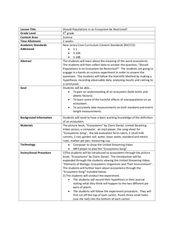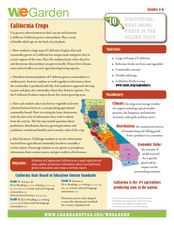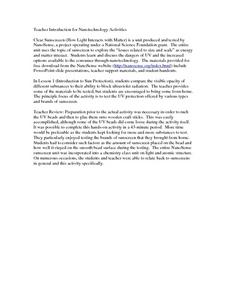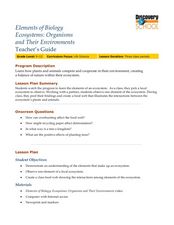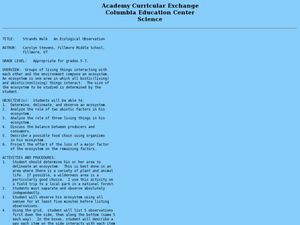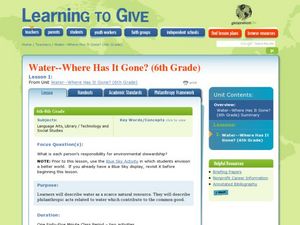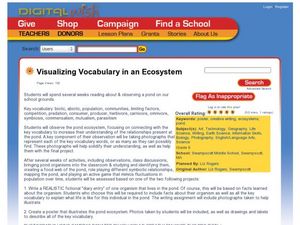Curated OER
Should Populations in an Ecosystem be Restricted?
Fourth graders experiment to determine how overpopulation effects ecosystems specifically plants. In this ecosystem lesson, 4th graders conduct an ecosystems experiment after listening to Claire Daniel's, Ecosystems. They watch a video,...
Curated OER
California Crops
Students explore agriculture by researching the native food crops of California. Students define a list of agriculture vocabulary terms and analyze maps of California which explain which foods come from which area. Students write a...
Curated OER
Breaking It Down
Seventh graders explain the mechanism of digestion. In this biology instructional activity, 7th graders perform an iodine test to check for the presence of starch. They discuss how energy travels through the food chain.
Curated OER
Nanoscience and Sunscreen
Students use the topic of sunscreen to explore the "issues related to size and scale" as energy and matter interact. They compare the visible opacity of different substances to their ability to block ultraviolet radiation.
Curated OER
What Is Life?
In this life characteristics worksheet, students answer 16 questions about living things, Redi's experiment, basic needs, growth and development.
Curated OER
Go to the Source- Your Town's Tap Water
Students investigate their town's tap water. In this water quality lesson, students complete a simple taste-testing experiment and online research to investigate tap water.
Curated OER
Organisms and Their Environments
Learners study a local ecosystem and research the organisms to create a food web. In this ecosystem activity, students view a video and answer questions. They visit a local ecosystem and make a list of organisms to research. Learners...
Curated OER
Strands Walk-An Ecological Obseravtion
In this ecosystem worksheet, students investigate an ecosystem at a local park or national forest, they make observations for five minutes, they complete a grid of their observations and they construct a hypothetical food chain. Students...
Curated OER
The Miracle Resource - From Forest to Products
Young scholars create a collage of wood products labeled by type of wood product. In this product engineering lesson plan, students work in groups to find pictures of solid wood products, engineered wood products, wood pulp, paper...
Curated OER
Stopping Global Climate Change
Students synthesize or express concepts towards solving the question posed at each lab station about climate change. After all lab teams have finished, the teacher facilitates a class discussion on teams' responses to each station.
Curated OER
Arthropods at Home: Spider, Isopod, or any Arthropod
Second graders observe, discuss, and record the requirements of a healthy environment for both arthropods and people by designing and maintaining an artificial habitat for an arthropod, and considering the requirements for a healthy body...
Curated OER
The Gaia Hypothesis: An Approach to Problem Solving in the Environment
Students are introduced to the Gaia hypothesis by examining a conceptual sketch. In groups, they analyze the way they can use Dewey's method for problem solving to solve problems within the environment. They are given a problem facing...
Curated OER
Trophic Ecology of Humans
students analyze the place of humans among the tropic levels by observing what we eat. They calculate the caloric content of several foods commonly eaten by humans and calculate the total energy cost to grow, process, transport, store...
Curated OER
Trophic Ecology of Humans
Students analyze the trophic level of humans by first calculating the kilocalories in own their lunch. They then calulate the kilocalories in a wide variety of foods found in grocery stores and compare the kilocalories needed to acquire...
Curated OER
Kinetics Worksheet
In this kinetics worksheet, students solve twenty one problems related to reaction rates, half life, reaction orders, catalysts, and activation energy.
Curated OER
Understanding the Conservation of Energy
In this conservation of energy worksheet, students read about the law of conservation of energy and about energy distribution. They answer three critical thinking questions about what the law of conservation of energy means to us for...
Curated OER
Filling Up
In this filling up worksheet, students calculate the E85 per gasoline-gallon equivalent price to the E85 price per gallon to complete a chart of "alternative fuel". They use the data along with the price per gallon of gasoline to plot...
Curated OER
Unit Conversions-Energy, Power, Flux
In this unit conversion instructional activity, students solve 4 problems given a list of conversion factors for units of energy, power and flux.
Curated OER
Water--Where Has It Gone?: Earth Day
Students explore the concept of philanthropy. In this environmental stewardship lesson, students consider the plight of water as they consider water use and distribution. Students listen to an excerpt from The Well and consider...
Curated OER
Visualizing Vocabulary in an Ecosystem
Sixth graders observe the pond ecosystem. In this ecosystem activity, 6th graders observe the organisms at the pond and create a poster that illustrates the pond.
Curated OER
Economics: What Are Some Other Uses for Rice?
Sixth graders investigate ways rice is sold by creating a chart of the different rice foods. In this economics instructional activity, 6th graders examine their local food store and list at least 10 rice by-products in a class chart....
Curated OER
Ecology of the Savanna-Forest Boundaries in Central Brazil
Learners explore photosynthesis. In this photosynthesis lesson, students label parts of photosynthesis and take notes. Learners conduct experiments on leaves, make observations and record their findings.
Curated OER
Give Me Some Sugar, Honey!
Students research the history of honey and different products that come from honey. In this bees and honey lesson, students review how honey is made, discuss ways people use honey, research the history of honey and its uses, create...
Curated OER
Water and Land Ecosystems
Students investigate the differences between a land and aquatic ecosystem. They use the information in order to present it in an assessment. There are target questions that can be used to guide research, lead a classroom discussion, or...


